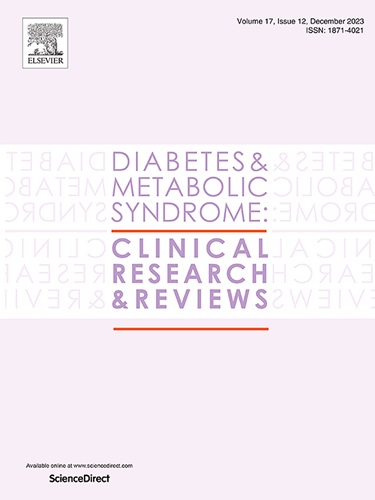调整早餐时间可改善 2 型糖尿病患者的餐后血糖:随机对照试验。
IF 4.3
Q1 ENDOCRINOLOGY & METABOLISM
Diabetes & Metabolic Syndrome-Clinical Research & Reviews
Pub Date : 2024-11-01
DOI:10.1016/j.dsx.2024.103157
引用次数: 0
摘要
目的:研究早餐时间对 2 型糖尿病(T2D)成人餐后血糖的影响,以及早餐后步行 20 分钟的影响:11名成人2型糖尿病患者(57±7岁;HbA1c 7.4±1%)参加了为期六周的随机交叉对照试验,试验包括三个为期四天的条件:早(7:00)、中(9:30)和晚(12:00)。在每个条件之后,进行为期 4 天的第二次干预,即在每个条件之后步行 20 分钟。提供标准化早餐。测量间质葡萄糖和体力活动。采用线性混合效应模型分析了早餐后 2 小时的曲线下增量面积(iAUC)、24 小时的 iAUC 和空腹血糖。计算了早餐后 20 分钟步行 2 小时 iAUC 的 Cohen's d:结果:中段和延迟的早餐后 2 小时 iAUC 较低(p 结论:中段和延迟的早餐后 2 小时 iAUC 较高:对患有 T2D 的人来说,将早餐从早上 7 点推迟到中午或中午可降低餐后血糖。当早餐时间为早上 7 点或中午时,餐后额外步行 20 分钟对降低餐后血糖有微小作用,但当早餐时间为中午时,则没有额外益处。本文章由计算机程序翻译,如有差异,请以英文原文为准。
Modifying the timing of breakfast improves postprandial glycaemia in people with type 2 diabetes: A randomised controlled trial
Aims
Investigate the effects of breakfast timing on postprandial glycaemia in adults with type 2 diabetes (T2D), and the impact of a 20-min walk after breakfast.
Methods
Eleven adults with T2D (57 ± 7 y; HbA1c 7.4 ± 1%) participated in a six-week randomised crossover controlled trial comprising three 4-day conditions: Early (0700 h), Mid (0930 h) and Delayed (1200 h). After each condition, a second 4-day intervention of 20-min walk after each condition was undertaken. Standardised breakfast was provided. Interstitial glucose and physical activity were measured. Incremental area under the curve (iAUC) 2-h post-breakfast, 24-h iAUC, and fasting glucose were analysed with linear mixed-effects models. Cohen's d of the 2-h iAUC post-breakfast 20-min walk was calculated.
Results
Mid and Delayed had lower 2-h post-breakfast iAUC (p < 0.002, −57 mmol/L×2h; p < 0.02, −41 mmol/L×2h) compared to Early. There were no differences in fasting (0600 h) glucose or 24-h iAUC. There was a small effect of the 20-min walk on lowering 2-h post-breakfast iAUC for Early (d = 0.35) and Delayed (d = 0.37), with no effect in Mid.
Conclusion
In people with T2D, delaying breakfast from 0700 h to mid-morning or midday reduced postprandial glycaemia. Additional post-meal walking for 20 min had a small effect in lowering postprandial glycaemia when breakfast was at 0700 h or midday, but provided no additional benefit when breakfast was at mid-morning.
求助全文
通过发布文献求助,成功后即可免费获取论文全文。
去求助
来源期刊

Diabetes & Metabolic Syndrome-Clinical Research & Reviews
ENDOCRINOLOGY & METABOLISM-
CiteScore
22.90
自引率
2.00%
发文量
248
审稿时长
51 days
期刊介绍:
Diabetes and Metabolic Syndrome: Clinical Research and Reviews is the official journal of DiabetesIndia. It aims to provide a global platform for healthcare professionals, diabetes educators, and other stakeholders to submit their research on diabetes care.
Types of Publications:
Diabetes and Metabolic Syndrome: Clinical Research and Reviews publishes peer-reviewed original articles, reviews, short communications, case reports, letters to the Editor, and expert comments. Reviews and mini-reviews are particularly welcomed for areas within endocrinology undergoing rapid changes.
 求助内容:
求助内容: 应助结果提醒方式:
应助结果提醒方式:


